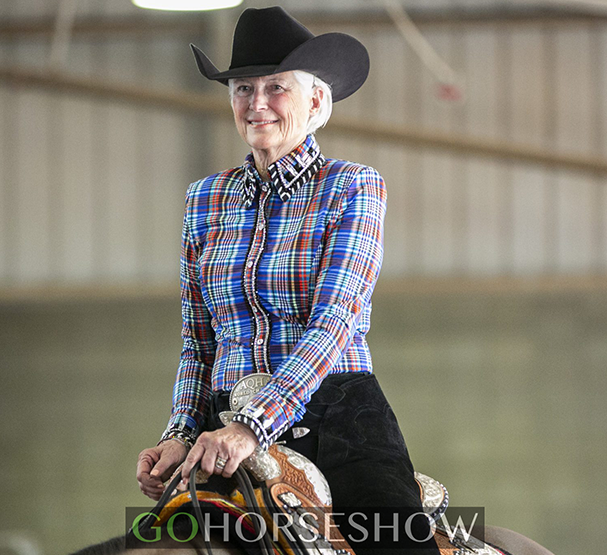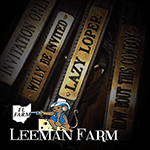What are some lessons you’ve learned from your horses? We posed this question to trainers and exhibitors who have had several horses throughout their show careers. They did not disappoint with their insightful and honest admissions.
Great advice for newcomers and even veterans to take heed to before they enter the pen. Some memorable points include, “trust the process,” “no horse is the same,” and “be present.” And as most know, these lessons can be carried over to your everyday life. Let’s find out what leading equestrians had to say about this inspiring topic.
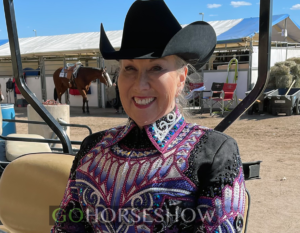 June Liston – Don’t ride through the good. Although your practice is feeling great, your horse is riding great. You love your ride, don’t practice so much at one time that you start to encounter other issues. Quit on a high note, don’t leave it all in the warm-up pen. Your horse did a good job. Reward them with a pet and dismount.
June Liston – Don’t ride through the good. Although your practice is feeling great, your horse is riding great. You love your ride, don’t practice so much at one time that you start to encounter other issues. Quit on a high note, don’t leave it all in the warm-up pen. Your horse did a good job. Reward them with a pet and dismount.
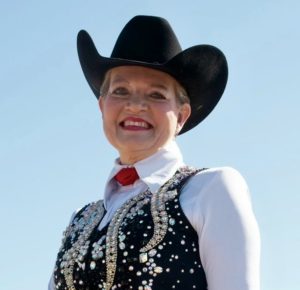 Brister Shum – My previous show partners taught me the importance of really ‘connecting’ to your horse, connecting in the feel for his movement, impulsion, and foot placement and how he feels or his mood for that day. Developing that connection (which often takes a year or more) makes me feel like I am working with a partner. That partnership makes it a lot more fun to show. Sometimes we win, and sometimes we learn.
Brister Shum – My previous show partners taught me the importance of really ‘connecting’ to your horse, connecting in the feel for his movement, impulsion, and foot placement and how he feels or his mood for that day. Developing that connection (which often takes a year or more) makes me feel like I am working with a partner. That partnership makes it a lot more fun to show. Sometimes we win, and sometimes we learn.
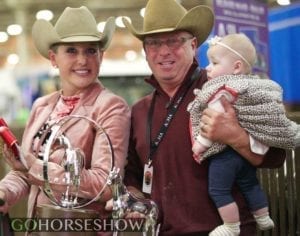 Kaye Neil Ivins-Ochetto – I’ve learned I will take heart and mind over unusual movement every time. Of course, the ultimate is to have both, but no matter how good a mover you have, there is always a limit if they don’t want to please and win also. A great horse can change everything you believe in yourself. I hated horsemanship for many years. I later came to realize it wasn’t the class, but the partner. The right partner changed everything in me. It is now one of my most beloved classes, and that has given me new confidence inside and outside of the show pen. The hard horses teach you how to ride. The great horses teach you how to show and appreciate the moments. Keep building your horse’s confidence and ask them to give all they are capable of doing. I learned that from an exceptional mare I was blessed to partner with. When I thought she was giving it all, she gave more. And she brought more out of me. I hope to hold onto that for future horses as well.
Kaye Neil Ivins-Ochetto – I’ve learned I will take heart and mind over unusual movement every time. Of course, the ultimate is to have both, but no matter how good a mover you have, there is always a limit if they don’t want to please and win also. A great horse can change everything you believe in yourself. I hated horsemanship for many years. I later came to realize it wasn’t the class, but the partner. The right partner changed everything in me. It is now one of my most beloved classes, and that has given me new confidence inside and outside of the show pen. The hard horses teach you how to ride. The great horses teach you how to show and appreciate the moments. Keep building your horse’s confidence and ask them to give all they are capable of doing. I learned that from an exceptional mare I was blessed to partner with. When I thought she was giving it all, she gave more. And she brought more out of me. I hope to hold onto that for future horses as well.
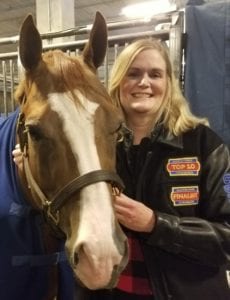 Robyn Garcia – I’ve learned from past horses that a horse with a sound mind is priceless. An excellent-minded horse makes everything more accessible and more enjoyable.
Robyn Garcia – I’ve learned from past horses that a horse with a sound mind is priceless. An excellent-minded horse makes everything more accessible and more enjoyable.
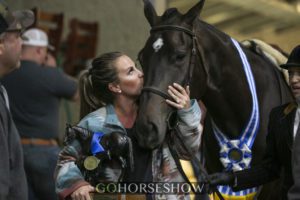 Tali Terlizzi – The biggest thing I’ve learned is that you can’t ride every horse the same. I used to be a big control freak in the pen where I constantly worried, “is their head down,” “am I too fast,” “am I too slow,” “what do their legs look like,” “am I sitting back?” instead of just enjoying the ride. But, getting comfortable in the show pen comes with time. I’ve learned to trust my horse training more and simplify it, which helped me ride better and “show” off my horse and what I have that day.
Tali Terlizzi – The biggest thing I’ve learned is that you can’t ride every horse the same. I used to be a big control freak in the pen where I constantly worried, “is their head down,” “am I too fast,” “am I too slow,” “what do their legs look like,” “am I sitting back?” instead of just enjoying the ride. But, getting comfortable in the show pen comes with time. I’ve learned to trust my horse training more and simplify it, which helped me ride better and “show” off my horse and what I have that day.
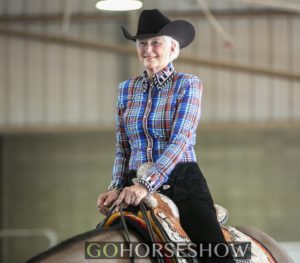 Kathy Tobin – I’ve learned to ride every stride, ride what your horse gives you, and keep riding despite a bauble. It’s kind of like, fake it if you can.
Kathy Tobin – I’ve learned to ride every stride, ride what your horse gives you, and keep riding despite a bauble. It’s kind of like, fake it if you can.
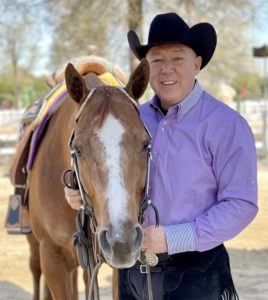 Joe Whitt – I have shown eight different horses in the past ten years since coming back to showing after taking about five years off. I have learned from each of those horses, which has helped me grow my skills. I have learned that every horse is different, and you must ride the horse you have to the best of your ability. I have tried to get to know each horse and bond with them. I’ve learned that each horse takes time, and you must respect their timeline. Riding different horses has helped me be sharper when showing and more intuitive of the horse I am showing that day.
Joe Whitt – I have shown eight different horses in the past ten years since coming back to showing after taking about five years off. I have learned from each of those horses, which has helped me grow my skills. I have learned that every horse is different, and you must ride the horse you have to the best of your ability. I have tried to get to know each horse and bond with them. I’ve learned that each horse takes time, and you must respect their timeline. Riding different horses has helped me be sharper when showing and more intuitive of the horse I am showing that day.
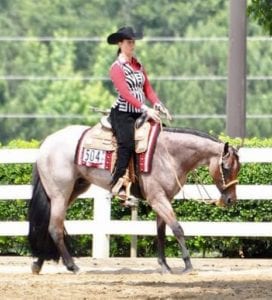 Adrienne Cober Dickerson – Patience! You can only control an animal so much…listen to them and let them tell you when they can handle the tasks you ask them to do.
Adrienne Cober Dickerson – Patience! You can only control an animal so much…listen to them and let them tell you when they can handle the tasks you ask them to do.
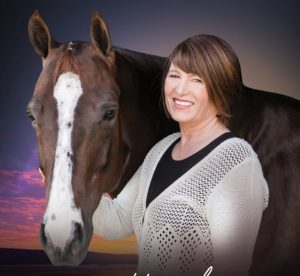 Sharon Conway – I mostly show what I breed and raise, so my perspective may differ from other amateurs. Enjoy the process and trust in the process. Every horse develops into a show horse differently. Don’t rush it to fit your timeline. Just because one isn’t strong enough to be an excellent two-year-old, doesn’t mean it won’t catch up to a four-year-old. Let your horse tell you what it wants to be good at. The horses are too competitive these days. They have to enjoy their job to be truly good at it. And when one comes into their own, cherish it because a good one is hard to find.
Sharon Conway – I mostly show what I breed and raise, so my perspective may differ from other amateurs. Enjoy the process and trust in the process. Every horse develops into a show horse differently. Don’t rush it to fit your timeline. Just because one isn’t strong enough to be an excellent two-year-old, doesn’t mean it won’t catch up to a four-year-old. Let your horse tell you what it wants to be good at. The horses are too competitive these days. They have to enjoy their job to be truly good at it. And when one comes into their own, cherish it because a good one is hard to find.
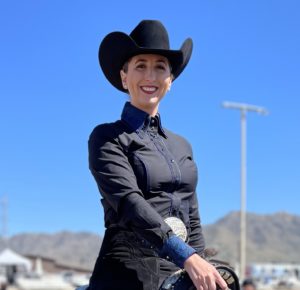 Samantha Foust – My western pleasure gelding was not always the easiest to show. He always tried to be one step ahead of me, and I always had to outsmart him or play his game. This gave me a lot of show knowledge about navigating the arena. He taught me how to look ahead and plan my ride…who I would follow in the arena, when I would reverse, how to navigate traffic. Now, I have a mare that wishes I would stay out of her way while we show.
Samantha Foust – My western pleasure gelding was not always the easiest to show. He always tried to be one step ahead of me, and I always had to outsmart him or play his game. This gave me a lot of show knowledge about navigating the arena. He taught me how to look ahead and plan my ride…who I would follow in the arena, when I would reverse, how to navigate traffic. Now, I have a mare that wishes I would stay out of her way while we show.
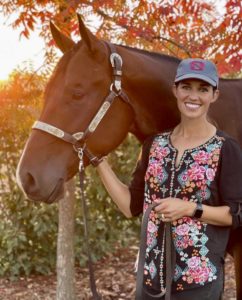 Lauren Stanley – Each horse I’ve had has taught me something that I carry with me today. My precious all-around horse taught me to appreciate a horse’s natural talent. He was the most gifted horse I’d swung a leg over at the time, and it was intimidating. But as time went on, I learned to embrace his style and talent to let him shine when and how he wanted to. My first reiner taught me to plan a show season around big goals and not focus on “winning” every show. You will build a lasting partner if you do what is best for the horse in the show pen. You may have to sacrifice a few small wins, but it will be worth it. My old ranch rider taught me that just because you buy a horse with the intent to show them in a specific class, doesn’t mean that’s the best class for them. I originally bought her as a reiner, and she struggled in that event. When AQHA added ranch classes, I converted her to that, and wow, did she shine. She loved it out there and is still successful with her new owners. I am so grateful for the things they have taught me. If only I knew then what I know now.
Lauren Stanley – Each horse I’ve had has taught me something that I carry with me today. My precious all-around horse taught me to appreciate a horse’s natural talent. He was the most gifted horse I’d swung a leg over at the time, and it was intimidating. But as time went on, I learned to embrace his style and talent to let him shine when and how he wanted to. My first reiner taught me to plan a show season around big goals and not focus on “winning” every show. You will build a lasting partner if you do what is best for the horse in the show pen. You may have to sacrifice a few small wins, but it will be worth it. My old ranch rider taught me that just because you buy a horse with the intent to show them in a specific class, doesn’t mean that’s the best class for them. I originally bought her as a reiner, and she struggled in that event. When AQHA added ranch classes, I converted her to that, and wow, did she shine. She loved it out there and is still successful with her new owners. I am so grateful for the things they have taught me. If only I knew then what I know now.
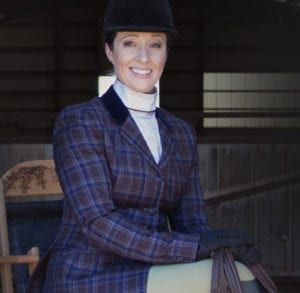 Alyse Roberts – I learned pretty early that each horse is an individual, and they have their minds, so we cannot ride them all the same. I’ve had some great horses that were either mentally fried or just tough, and those horses taught me to think outside the box on how to get them to enjoy their jobs again and go around.
Alyse Roberts – I learned pretty early that each horse is an individual, and they have their minds, so we cannot ride them all the same. I’ve had some great horses that were either mentally fried or just tough, and those horses taught me to think outside the box on how to get them to enjoy their jobs again and go around.
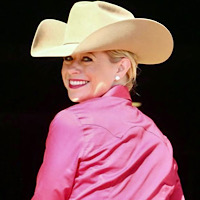 Cassie Riggert – The two things coming to mind are trust your training at home, and it almost always feels worse than it looks; keep showing.
Cassie Riggert – The two things coming to mind are trust your training at home, and it almost always feels worse than it looks; keep showing.
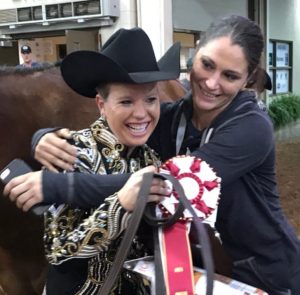 Ashley Hadlock– Trust the process, and don’t let the setbacks discourage you. Take each day at a time, and work with the horse you have on that given day. Then, when it all comes together, the results will make the hard work worth it.
Ashley Hadlock– Trust the process, and don’t let the setbacks discourage you. Take each day at a time, and work with the horse you have on that given day. Then, when it all comes together, the results will make the hard work worth it.
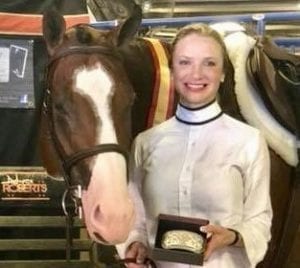 Jenna Tolson – As cliché as it sounds, the strength is in the struggle, and personal growth doesn’t come from our comfort zones. I’ve rarely had an easy horse to show. Some were just difficult horses, and others were not great in the show pen. As frustrating and demoralizing as it has been, it has forced me to grow as a rider. I’ve had to get better. I’m still working on getting better. It also made me level up mentally. It’s tough to work so hard and then go out there and get your ass handed to you regularly, and I don’t care who you are. But, I’ve learned you focus on the process and what you can do better tomorrow, rather than the outcome. If you’re getting 1% better every day, the outcome eventually takes care of itself. Lest we forget, horses will humble you in a hurry if you don’t stay grounded. On the flip side, I’ve had the fortune to ride and show one “great one.” And wow, there’s just no comparable feeling. Special horses do extraordinary things in special ways. You’re always hunting for that feeling again.
Jenna Tolson – As cliché as it sounds, the strength is in the struggle, and personal growth doesn’t come from our comfort zones. I’ve rarely had an easy horse to show. Some were just difficult horses, and others were not great in the show pen. As frustrating and demoralizing as it has been, it has forced me to grow as a rider. I’ve had to get better. I’m still working on getting better. It also made me level up mentally. It’s tough to work so hard and then go out there and get your ass handed to you regularly, and I don’t care who you are. But, I’ve learned you focus on the process and what you can do better tomorrow, rather than the outcome. If you’re getting 1% better every day, the outcome eventually takes care of itself. Lest we forget, horses will humble you in a hurry if you don’t stay grounded. On the flip side, I’ve had the fortune to ride and show one “great one.” And wow, there’s just no comparable feeling. Special horses do extraordinary things in special ways. You’re always hunting for that feeling again.
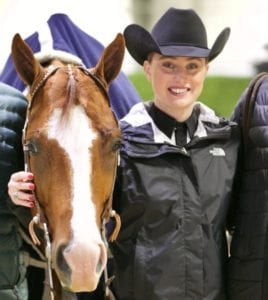 Johnna Letchworth – I think the most important thing I have learned from past horses is that no two horses will ever be the same. Similarities, maybe. You can’t expect every horse to come along as fast as one might have. Nor can you expect them to be as willing, quiet, or just as easy. But that’s what makes it fun. Every horse I’ve owned has taught me something new and made me a better horsewoman for it.
Johnna Letchworth – I think the most important thing I have learned from past horses is that no two horses will ever be the same. Similarities, maybe. You can’t expect every horse to come along as fast as one might have. Nor can you expect them to be as willing, quiet, or just as easy. But that’s what makes it fun. Every horse I’ve owned has taught me something new and made me a better horsewoman for it.
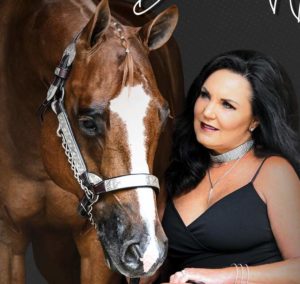 Denise Spinelli White – Over the years, I have learned to trust, to have patience with myself and my horses, and when things go wrong, not to get discouraged because there’s always another chance. Each of my horses has taught me valuable lessons that have helped me get to where I am now. Even a bad ride will teach you something. It’s not always about the win; it may be about mastering that one piece you’ve been working so hard on.
Denise Spinelli White – Over the years, I have learned to trust, to have patience with myself and my horses, and when things go wrong, not to get discouraged because there’s always another chance. Each of my horses has taught me valuable lessons that have helped me get to where I am now. Even a bad ride will teach you something. It’s not always about the win; it may be about mastering that one piece you’ve been working so hard on.
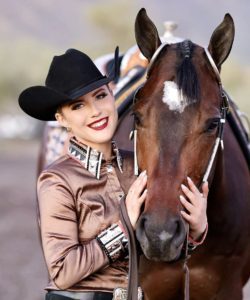 Madison Nirenstein – I’d say one of the biggest lessons I’ve learned from my past horses and current ones is to be patient. If showing horses teach us anything, it’s to enjoy the journey and not trip over the small stuff. I think patience proves helpful in many ways – in the show pen, particularly during pattern classes (not rushing through every maneuver and being meticulous with each step), with younger horses (learning to enjoy their growth and understanding there will be challenging periods along the way), and with your personal development as a horseman/woman (admiring the hard work you put in and not expecting overnight success).
Madison Nirenstein – I’d say one of the biggest lessons I’ve learned from my past horses and current ones is to be patient. If showing horses teach us anything, it’s to enjoy the journey and not trip over the small stuff. I think patience proves helpful in many ways – in the show pen, particularly during pattern classes (not rushing through every maneuver and being meticulous with each step), with younger horses (learning to enjoy their growth and understanding there will be challenging periods along the way), and with your personal development as a horseman/woman (admiring the hard work you put in and not expecting overnight success).
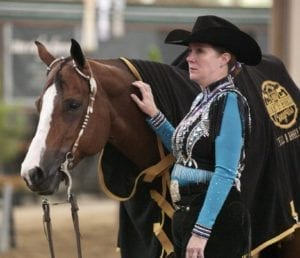 Heather Lange – “Trust the Process” – When I bought Rosey (Tell A Rosey Story), she was supposed to have 2+ years to grow up while I continued to show my older horse. Unfortunately, his career-ending injury put Rosey front and center. I went from showing the all-around to groom. I watched (not always patiently) my trainers, Tami and Garry McAllister, build Rosey for me. I had setbacks and doubts along the way, but they believed in Rosey. Whether forward or back, every step had a purpose in building our partnership. Every effort was a part of the goals we reached. As we introduce my new horse to the all-around events, I am trying to focus on the process, appreciating the little goals along the way, and having faith in the process.
Heather Lange – “Trust the Process” – When I bought Rosey (Tell A Rosey Story), she was supposed to have 2+ years to grow up while I continued to show my older horse. Unfortunately, his career-ending injury put Rosey front and center. I went from showing the all-around to groom. I watched (not always patiently) my trainers, Tami and Garry McAllister, build Rosey for me. I had setbacks and doubts along the way, but they believed in Rosey. Whether forward or back, every step had a purpose in building our partnership. Every effort was a part of the goals we reached. As we introduce my new horse to the all-around events, I am trying to focus on the process, appreciating the little goals along the way, and having faith in the process.
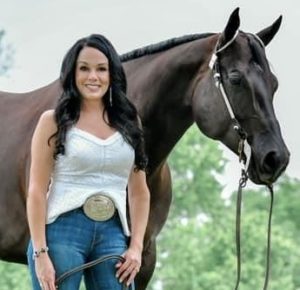 Kara Sisco – “Be Present” – Over the years, I have learned to be present in the moment. Whether it is a lesson at home, bathing them, wrapping their legs, my trainers prepping us at the horse show, walking into the show pen, etc. I ran at high RPMs and tended to be thinking about work, home, etc., basically self-sabotaging my time with my partner. I was distracted and not in the moment, which was completely unfair to my partner when they were working hard, trying to please and deliver. When I’m at the Knabenshue’s training barn or the horse show, I consciously slow everything down, compartmentalize, absorb all the information my trainers give me, take a deep breath, stand in the arena, pet my partner. Once I put her away, give her carrots. Be present. Be in the moment. Express appreciation for our excellent show partners. It’s taken me a long time to get here, but this year has been the sweetest, most rewarding yet.
Kara Sisco – “Be Present” – Over the years, I have learned to be present in the moment. Whether it is a lesson at home, bathing them, wrapping their legs, my trainers prepping us at the horse show, walking into the show pen, etc. I ran at high RPMs and tended to be thinking about work, home, etc., basically self-sabotaging my time with my partner. I was distracted and not in the moment, which was completely unfair to my partner when they were working hard, trying to please and deliver. When I’m at the Knabenshue’s training barn or the horse show, I consciously slow everything down, compartmentalize, absorb all the information my trainers give me, take a deep breath, stand in the arena, pet my partner. Once I put her away, give her carrots. Be present. Be in the moment. Express appreciation for our excellent show partners. It’s taken me a long time to get here, but this year has been the sweetest, most rewarding yet.
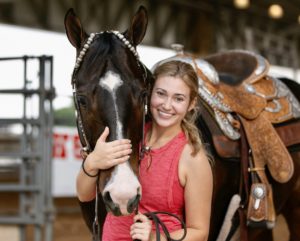 Paige Wacker – I’ve learned so many valuable lessons from each horse that’s come into my life. Ima Moxie Man, aka “Frog,” taught me the importance of ensuring your horse is tired enough before you show. He was a tough old man, but was secretly a teddy bear. My unicorn that passed away, Clearly A Goodbar aka “Jackson,” taught me the importance of patience. He was an insecure horse and needed me to be his friend and help him through his insecurities. For example, he was terrified of the wash stall and a white horse. I would use treats and take my time to get him into the wash rack. I never hit him or forced him in. Before his passing, I gave him a full bath without any hesitation. Javah Mon, aka “Willie,” taught me how to trust. I was never very confident in the riding classes, and I experienced a lot of self-doubts. Willie was such an honest animal and gave me 110% every time. Visible Investment, aka “Dudley,” was my dream horse. He was my steady boy and had the kindest soul. He reminded me of building a strong partnership with your horse. My latest horse, WhiteTrashMillionaire, aka “Maverick,” has taught me much about myself inside and outside the horses. He and I would test each other every day and push one another to be our best. He taught me how to be brave and trust in myself. There were many times I grabbed the saddle horn after he’d spook at his own shadow and had severe scars from all the blisters. Maverick is not easy, but he always showed up for me. I like to believe he worked out of love.
Paige Wacker – I’ve learned so many valuable lessons from each horse that’s come into my life. Ima Moxie Man, aka “Frog,” taught me the importance of ensuring your horse is tired enough before you show. He was a tough old man, but was secretly a teddy bear. My unicorn that passed away, Clearly A Goodbar aka “Jackson,” taught me the importance of patience. He was an insecure horse and needed me to be his friend and help him through his insecurities. For example, he was terrified of the wash stall and a white horse. I would use treats and take my time to get him into the wash rack. I never hit him or forced him in. Before his passing, I gave him a full bath without any hesitation. Javah Mon, aka “Willie,” taught me how to trust. I was never very confident in the riding classes, and I experienced a lot of self-doubts. Willie was such an honest animal and gave me 110% every time. Visible Investment, aka “Dudley,” was my dream horse. He was my steady boy and had the kindest soul. He reminded me of building a strong partnership with your horse. My latest horse, WhiteTrashMillionaire, aka “Maverick,” has taught me much about myself inside and outside the horses. He and I would test each other every day and push one another to be our best. He taught me how to be brave and trust in myself. There were many times I grabbed the saddle horn after he’d spook at his own shadow and had severe scars from all the blisters. Maverick is not easy, but he always showed up for me. I like to believe he worked out of love.
What lessons have you learned from past horses? Let us know in the comments.


